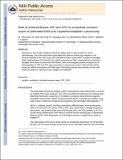Role of endonucleases XPF and XPG in nucleotide excision repair of platinated DNA and cisplatin/oxaliplatin cytotoxicity
Author(s)
Graf, Nora; Ang, Wee Han; Zhu, Guangyu; Myint, MyatNoeZin; Lippard, Stephen J.
DownloadLippard_Role of.pdf (1023.Kb)
OPEN_ACCESS_POLICY
Open Access Policy
Creative Commons Attribution-Noncommercial-Share Alike
Terms of use
Metadata
Show full item recordAbstract
Resistance of tumor cells to platinum anticancer agents poses a major problem in cancer chemotherapy. One of the mechanisms associated with platinum-based drug resistance is the enhanced capacity of the cell to carry out nucleotide excision repair (NER) on platinum-damaged DNA. Endonucleases XPF and XPG are critical components of NER, responsible for excising the damaged DNA strand to remove the DNA lesion. Here, we investigated possible consequences of down-regulation of XPF and XPG gene expression in osteosarcoma cancer cells (U2OS) and the impact on cellular transcription and DNA repair. We further evaluated the sensitivity of such cells toward the platinum anticancer drugs cisplatin and oxaliplatin.
Date issued
2011-03Department
Massachusetts Institute of Technology. Department of ChemistryJournal
ChemBioChem
Publisher
Wiley Blackwell (John Wiley & Sons)
Citation
Graf, Nora et al. “Role of Endonucleases XPF and XPG in Nucleotide Excision Repair of Platinated DNA and Cisplatin/Oxaliplatin Cytotoxicity.” ChemBioChem 12.7 (2011): 1115–1123.
Version: Author's final manuscript
ISSN
1439-4227
1439-7633